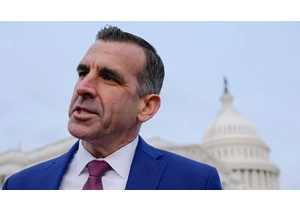Leaders of twenty internet service providers were feted by the president in the Rose Garden Monday for agreeing to raise broadband speeds and lower prices for low-income Americans. “This is a great example of how the public sector and the private sector can work together to solve serious problems,” Biden said after asking the honchos from the big ISPs to stand up and take a bow. But, as you might expect when AT&T, Verizon, and Comcast are involved, the truth is in the details. The White House says it won agreements from twenty carriers to provide broadband service to qualifying households for $30 a month as part of the Affordable Connectivity Program (ACP). The carriers, which included AT&T, Verizon, Comcast, Cox, Charter, and a number of regional players, promised their ACP plans would deliver download speeds of at least 100 megabits per second “everywhere that the provider’s infrastructure is capable of it,” according to a White House fact sheet. (More than 30 million Americans don’t live near broadband infrastructure capable of delivering “minimally acceptable speeds.”)
President Biden thanks high speed internet providers during White House event on lowering internet costs. Full video here: https://t.co/VLtdiQJhYS pic.twitter.com/VFz9pcPP31 — CSPAN (@cspan) May 9, 2022
Verizon, for example, agreed to lower its 200 mbps (for downloads) Fios service from $39.99 per month to $30 per month. Charter (better known by its trade name, Spectrum) agreed to double the speed of its $30 per month plan for ACP participants, to between 50 to 100 mbps (for downloads). Under the program, the government pays $30 per month of participants’ monthly broadband bill. More than 1,300 ISPs already offer service plans for ACP beneficiaries, the White House says, and more than 11.5 million households have signed up for them. But until now, the ACP plans often offered very slow speeds, explains National Digital Inclusion Alliance executive director Angela Siefer, so the agreement marks an improvement to the program. “They got a better offer from twenty providers,” Siefer says. To qualify for the ACP plans a household must be at or below 200% of the poverty level, or a member of the household must currently receive a federal benefit such as Medicaid, Pell Grants, or Supplemental Security Income (SSI). The government estimates there are 48 million such households in the U.S. The promises Biden won from the ISPs may earn the president some political goodwill heading into the midterms, but they won’t solve the country’s broadband problems, experts say. “It’s a good thing that a number of ISPs will offer broadband service at a low price, but we can’t pretend that this is somehow going to fix the problem of digital inclusion,” says Harold Feld, a vice president at Public Knowledge, a D.C.-based public interest group cofounded by Gigi Sohn, Biden’s nominee for FCC commissioner. Both Feld and Siefer point out that the agreement the White House struck with the ISPs is voluntary and non-binding. “Anybody can change their mind at any time,” Siefer says. “This is in no way price regulation.” “Carriers could decide to withdraw next year or the year after that,” Feld says. “They might say ‘we’re just losing too many [higher-paying] customers so we’re going to have to drop this’.” The ACP broadband plans, in many cases, may simply offer lower-income people the price-per-megabit that everybody should get, regardless of income. The United States has the highest broadband prices of any country in the developed world. The U.S. government, influenced by the powerful lobbies of the ISPs, have, through action or inaction, allowed national cable and telecommunications companies to operate in markets where they face little or no real competition. Monday’s agreement comes as some of the biggest wireless carriers move toward raising prices during this period of inflation. AT&T has confirmed that it’s planning to raise prices on its legacy plans, citing inflation as a reason. And Fortune reports that Verizon is now considering raising the prices of its wireless plans “as one of several possible options to pass along inflation-related costs to consumers.” Meanwhile, the telecommunications industry lobby has been trying to derail the confirmation of Democrat Gigi Sohn to fill the lone empty seat at the FCC. Sohn has a sterling reputation on both sides of the aisle for her work promoting competition and serving underserved markets, both urban and rural. President Biden nominated Sohn in October 2021, but members of the Senate have slow-walked her confirmation. Telecom lobbyists have been working through proxies, publishing critical editorials and launching social media campaigns, in an effort to sow doubt among Senators about the nominee’s fitness for the job. The commitments of the ISPs on Monday should be seen in the context of their overall approach to servicing U.S. broadband markets, including their preference for working the refs in D.C. rather than offering more affordable service. “This is a downpayment that helps those in need,” Feld says. “Now we need a real solution for everyone.”
Ak chcete pridať komentár, prihláste sa
Ostatné príspevky v tejto skupine

Unwanted phone calls are out of control. Whether it’s a

California Democrat Rep. Sam Liccardo, a freshman congressman who represents Silicon Valley, said he’s surprised the first piece of legislation he’s sponsoring takes aim at President


President Donald Trump vowed to fight government abuse and introduce more transparency, a stance that might align him with a little-known agency charged with watching over the U.S.’s powerful spyi

For some time, meme coins have occupied a peculiar space in online culture. While there are peopl

Yope is the latest photo-sharing app vying to take on Instagram and TikTok.
The pitch? A hybrid of a private Instagram and a group chat. While WhatsApp and Snapchat allow for group messa

It used to be that if you asked a classroom of kids what they want to be when they grow up, you’d get answers like “firefighter” and “astronaut.” These days, Gen Alpha dreams of becoming content c
